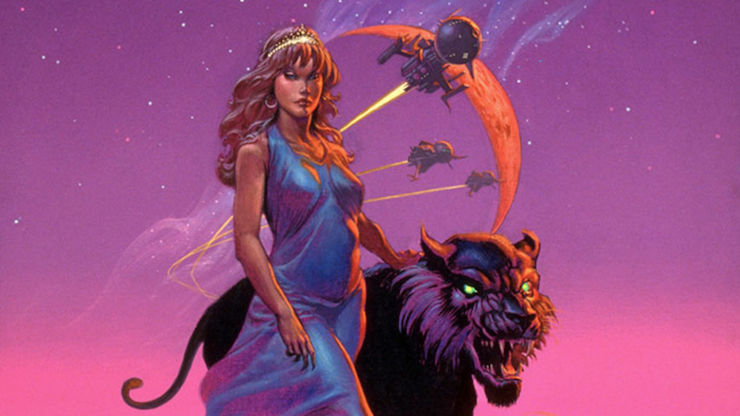I’m a nerd from a family of nerds, and I grew up reading a lot of science fiction. Specifically, I grew up reading a lot of my mother’s science fiction collection, which included a lot of brilliant writers, some of whose works are not as well-known today as they once were.
Since this is a pity, I’d like to introduce you to some of the books that affected me strongly growing up, and influenced me as a reader—and probably also as a writer.
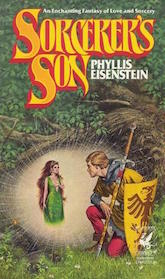 Phyllis Eisenstein, Sorcerer’s Son (1979)
Phyllis Eisenstein, Sorcerer’s Son (1979)
This is a delightful little book about two sorcerers, a demon, and their child. (Yes, it’s complicated.) One of the sorcerers has extremely powerful nature magic; she’s a woman with a gift for working with woven things, and she spends her time nerding out about botany, mostly. The demon is a decent-hearted sort who is bound by the second sorcerer. Because that other sorcerer is a nasty piece of work who gets his power from enslaving unwilling demons, and who assumes that everybody else is a nasty piece of work too, he lays a lot of complicated plots in order to defend himself from enemies that don’t exist until he creates them. This works out poorly for him in the long run, because his kid takes after his mother and the demon.
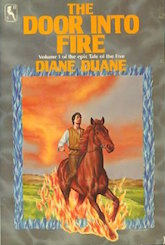 Diane Duane, The Door into Fire (1979)
Diane Duane, The Door into Fire (1979)
Herewiss is a sorcerer who is one of the very few men in history to have been born with access to the blue Fire, the most powerful magic of all, which burns up the life force of its users. The problem is, that he can’t channel it to do anything useful because it breaks every sword he creates—and his lover, Prince Freelorn, has been trapped by evil forces in a tower and needs rescue. So off Herewiss goes, hoping he might figure out how to use his gifts in time to save his beloved. Along the way he meets Sunspark, my favorite semi-equine fire elemental personified star in fantasy. Queer and nontraditional relationships abound.
The second book in the series has really fantastic dragons.
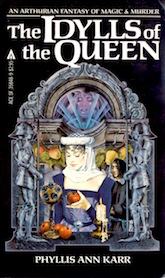 Phyllis Ann Karr, The Idylls of the Queen (1982)
Phyllis Ann Karr, The Idylls of the Queen (1982)
Sir Patrise has been murdered, and it’s up to Sir Kay and Sir Mordred to find Sir Lancelot so he can prove Queen Guenevere’s innocence, or she’ll be burned at the stake.
Neither of them much likes Sir Lancelot, unfortunately. And nobody has any idea where he’s wandered off to this time, as he’s not exactly the most reliable dude around…
I love this book so much, you guys.
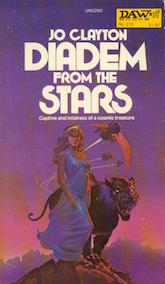 Jo Clayton, Diadem from the Stars (1977)
Jo Clayton, Diadem from the Stars (1977)
There’s a girl in a profoundly misogynous society, whose mother was an offworlder. She gets her hands on a powerful alien artifact that she doesn’t know how to use, and makes her escape. This is a feminist revisioning of the planetary romance, and it shows the influence of Jack Vance and similar authors—the lone wanderer in a post-technology barbaric world that hovers somewhere between magic and superscience.
Definitely on the grimdark side, this might appeal to fans of N.K. Jemisin’s Broken Earth trilogy.
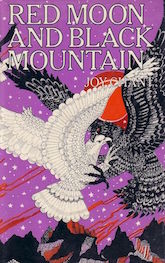 Joy Chant, Red Moon and Black Mountain (1970)
Joy Chant, Red Moon and Black Mountain (1970)
On the face of it, this is a fairly standard portal fantasy story about three children who find themselves in a fantasy world and are chosen to save it. Initially published as adult fantasy, it would probably be considered YA now, because of the age of the protagonists. The strength of this book is not necessarily the plotting, which is a little bit Narnia Meets The Lord Of The Rings, but the glorious prose, the nuanced characterizations, and the very modern willingness to take moral ambiguity on the chin.
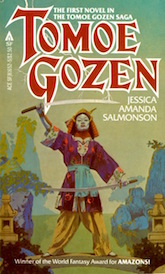 Jessica Amanda Salmonson, Tomoe Gozen (1981)
Jessica Amanda Salmonson, Tomoe Gozen (1981)
A historical fantasy set in Japan, a magical/fantastic biography of the real 12th-century female samurai of the same name, this book (the first in a trilogy) was the first non-Western fantasy I ever read. I was ten years old, and it completely blew my mind and made me realize that there were whole realms of human experience that didn’t get reflected in most of the books I was exposed to. I suspect that feeling, that sense of “here is something really and completely awesome that has been erased from my awareness” is one of the things that sent me looking for more diverse writers and stories.
Tomoe Gozen also appears in C. J. Cherryh’s 1988 novel The Paladin, which I also remember loving and really need to reread.
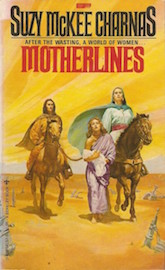 Suzy McKee Charnas, Motherlines (1978)
Suzy McKee Charnas, Motherlines (1978)
This is not an easy book to read on so many levels. It’s postapocalyptic, anthropological science fiction steeped in the despair and rage of women in the seventies, of feeling trapped by societal roles and needing to overthrow the whole shebang in order to win free. There was a whole subgenre of these books at the time, and this was my favorite of them. I also read this one inappropriately young, as it has some legendarily intense content.
I turned out okay!
It is full of gritty, awesome women, and so many lesbians. Recommended for fans of Richard Morgan’s THE STEEL REMAINS.
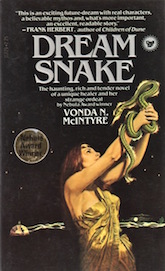 Vonda McIntyre, Dreamsnake (1978)
Vonda McIntyre, Dreamsnake (1978)
Another postapocalyptic SF novel about a young wanderer from the era when the only future so many of us could see was a nuclear one. The journeyman Healer Snake is out and about in the world when tragedy strikes, sending her on a quest that takes her through a number of remnant societies. This book is a solid adventure novel, fast-paced and full of incident, but it also deals strongly with thematic issues of class and education and personal responsibility and ethics. Includes a nonbinary character and nontraditional relationship structures.
A few notes:
I’ve limited this list to books that I read before high school, and read multiple times, and that I don’t generally hear widely discussed anymore. (Which is why several of my favorites weren’t mentioned here.) I also made the decision to limit it to women to narrow the field, and because I am a woman who often writes about women, and I suspect that in that, these authors influenced me strongly.
Also, it seems to me that women are less likely to be remembered, mentioned, and listed, and so their works are more likely to be forgotten after a few years.
This is a very white list, reflecting the demographics of the field at the time, and the sort of books that were available to my very young self: I didn’t encounter Octavia Butler and Tananarive Due until high school or college. I highly encourage readers to seek out their work, which is brilliant.
One thing I notice in compiling it is how queer some of these stories are. I think it’s fairly frequently forgotten that writers of SFF have been producing works about queer characters for generations—probably for the same reason that we forget that women writers have been producing SFF for as long as SFF has been a thing.
 Elizabeth Bear was the recipient of the John W. Campbell Award for Best New Writer in 2005. She has won two Hugo Awards for her short fiction, a Sturgeon Award, and the Locus Award for Best First Novel. Bear lives in South Hadley, Massachusetts, with her husband, novelist Scott Lynch. Stone Mad, the sequel to her novel Karen Memory, is available now from Tor.com Publishing.
Elizabeth Bear was the recipient of the John W. Campbell Award for Best New Writer in 2005. She has won two Hugo Awards for her short fiction, a Sturgeon Award, and the Locus Award for Best First Novel. Bear lives in South Hadley, Massachusetts, with her husband, novelist Scott Lynch. Stone Mad, the sequel to her novel Karen Memory, is available now from Tor.com Publishing.










